What are the best and worst low-carb foods?
The 10 Best Low-Carb Foods
1. Low-Carb Veggies
2. Nuts and Seeds
3. Cage-Free Eggs
4. Pasture-Raised Meat & Seafood
5. Fermented Foods
6. Healthy Fats/Oils
7. Bone Broth
8. Unsweetened Beverages
9. 100% Dark Chocolate/Cacao
10. Slow Carbs
The 10 Worst Low-Carb Foods
1. Protein Powders
2. Low Carb Tortillas & Bread
3. Vegetable Oils and Spreads
4. Processed Meat
5. Protein Bars
6. String cheese
7. Low-Carb Confections
8. Frozen Meals
9. Diet Soda
10. Keto Fast Food
Final Thoughts
“Keto” was the most googled diet trend of 2018.
The ultra-low-carb ketogenic (“keto”) diet has taken the wellness scene by storm. Social media is swarming with photos and success stories, captioned with hashtags like #ketoweightloss and #ketotransformations.
Of course, low-carb dieting isn’t exactly new to the weight-loss scene. Remember Atkins?
While different low-carbohydrate diets vary in terms of protein, fat, or total caloric intake, they all share one definitive characteristic: carbohydrates make up less than 30% of total daily calories (compared to 45-65% as recommended by the Institute of Medicine (1)).
On the keto diet, only about 5% of daily calories come from carbohydrates, which ensures the body stays in ketosis (burning fat, not blood sugar, for fuel).
What are the best and worst low-carb foods?
Whether or not a low-carb diet is right for you will depend on your own physiology and goals, and should always be discussed with your doctor. If you do choose to follow an LCHF diet to achieve your short-term health goals, like with any other diet, there is a healthy and unhealthy way to do so.
It is important to prioritize the nutrient value of what you eat, not only the net carb content.
Here are the best foods to eat (and the ones to avoid) to cut the carbs without harming your health…
The 10 Best Low-Carb Foods
Quite simply, the best low-carb foods come from nature. They are minimally processed and free of unnecessary chemicals, additives, or pesticides.
1. Low-Carb Veggies
Vegetables do contain some carbs, but that doesn’t mean you should avoid them!
Veggies are an essential part of a healthy diet. Plus, they are high in fiber, which makes them lower in net carbs, which is what you track on a LCHF diet.
Loading up on leafy greens and colorful low-carb vegetables will ensure you get plenty of disease-fighting antioxidants.
As a rule, veggies that grow above ground tend to be lower in net carbs. There are a few exceptions, of course, like pumpkins which grow above ground but are higher in carbs.
- Broccoli
- Cauliflower
- Brussel Sprouts
- Mushrooms
- Swiss Chard
- Asparagus
- Kale
- Spinach
- Collard Greens
- Green beans
- Arugula
- Leeks
- Onions
- Tomatoes
- Peppers
- Turnips
- Cabbage
- Bok choy
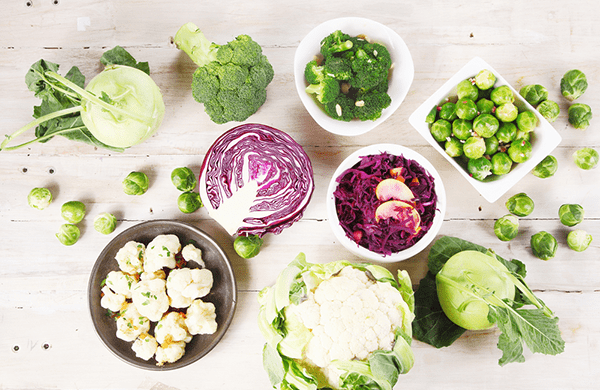
2. Nuts and Seeds
These little wonder foods are packed with good fats and nutrients that promote health and weight loss.
They are high in alpha-linoleic acid, known to support the body’s natural anti-inflammation response, and also rich in mono and polyunsaturated fats, which have been shown to support healthy blood sugar regulation. (2)
- Chia seeds
- Flaxseeds
- Almonds
- Walnuts
- Hazelnuts
- Pumpkin Seeds
- Hemp seeds
- Sunflower seeds
- Sesame seeds
- Brazil Nuts
- Pili nuts (the lowest-carb nut!)
- Macadamia nuts
3. Cage-Free Eggs
Eggs are one of nature’s most nutrient-dense sources of protein (6 grams per egg), containing all 9 essential amino acids and 14 key nutrients.
Even though they are high in cholesterol, this may not affect heart health like what was once thought. This is because eggs contain phospholipids which are shown to support healthy cholesterol levels. (3)
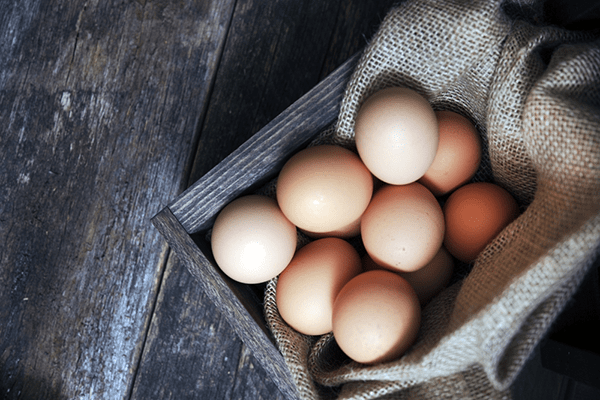
4. Pasture-Raised Meat & Seafood
Meat and seafood contain zero carbs and are excellent sources of protein and healthy fats.
Opt for grass-fed meats and free-range poultry, and avoid conventionally-farmed meats which are notably less nutritious and higher in inflammatory fats. These animals are raised in unhealthy conditions, fed unnatural, nutrient-poor diets, and given antibiotics and growth hormones.
Enjoy wild-caught seafood and limit shellfish and larger fish like tuna which tend to contain higher levels of heavy metals like mercury.
5. Fermented Foods
Fermented foods have been a staple for centuries in most diets throughout the world, and for good reason!
These foods, like sauerkraut, kimchi, and kombucha, are rich in beneficial bacteria which play an important role in digestion and gut health. (5)
Many of these gut-friendly foods are low in carbs, but be sure to read labels! Kombuchas, especially, often contain added fruit juice or even sugar for flavoring, which increases the carb count significantly.
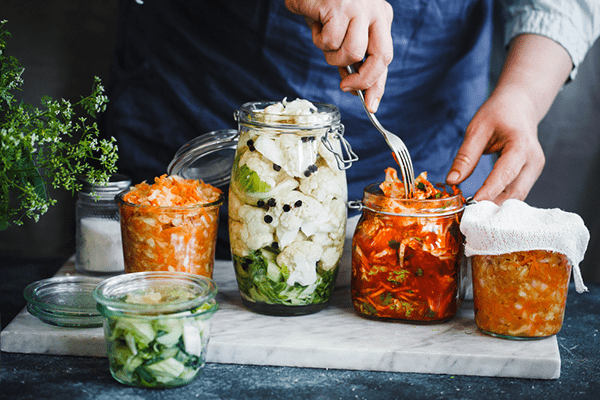
6. Healthy Fats/Oils
Fats are an essential component of low-carb success.
They fill you up without spiking your blood sugar, which helps manage sugar cravings.
Today’s experts agree that a diet higher in healthy fats (mono and polyunsaturated fats and omega 3 fatty acids) is better to support your metabolic health, weight management, and overall vitality.
And if the keto craze has proven anything, it’s that eating fat alone does not make you fat!
- Extra Virgin Olive Oil
- Coconut Oil
- Grass-fed butter or ghee
- Avocados
- Hemp oil
- Flaxseed oil
- Walnut
- Avocado oil
7. Bone Broth
This traditional food is loaded with collagen, amino acids, and minerals like calcium, magnesium, and potassium.
Bone broth has been shown to help support bone and joint health, as well as support digestion and the immune system. (6, 7)
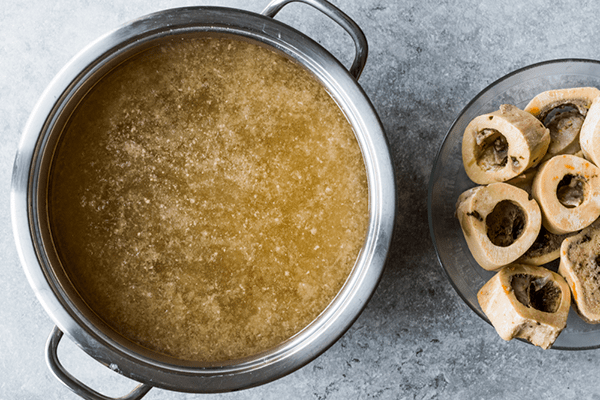
8. Unsweetened Beverages
Adequate water intake is essential for supporting your energy and overall health. Any of these unsweetened beverages can be a healthful component of a low-carb diet as well.
- Water or sparkling water
- Black coffee
- Tea (black tea, green tea, herbal tea, rooibos, etc.)
- Unsweetened nut milk
9. 100% Dark Chocolate/Cacao
If you needed an excuse to keep chocolate in your low-carb lifestyle, here it is:
Cocoa is a rich source of flavanols, chemical compounds which may help healthy blood sugar regulation and even support your heart.
Go for at least 70% cacao to ensure the lowest sugar/carb count. There are also some keto-friendly dark chocolate bars sweetened with zero-calorie, natural sweeteners like stevia.
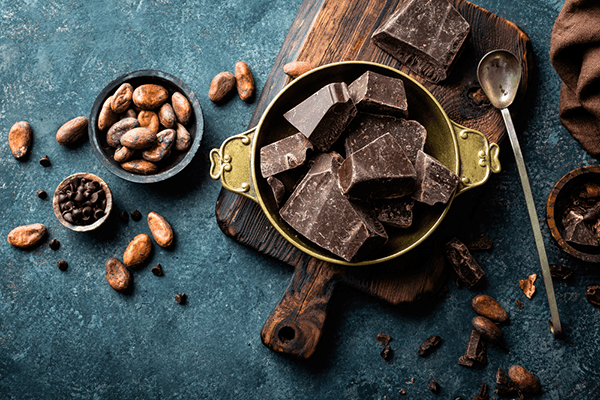
10. Slow Carbs
The quality of carbs we consume may impact our health more than the quantity of carbs.
After all, it’s the rapidly digestible, refined carbohydrates, not the high-fiber sources, that can wreak havoc on our overall health. (8)
If you are limiting carbohydrate intake but not following a strict keto diet, you may want to incorporate some nutrient-dense carbs and don’t spike blood sugar like processed carbs.
- Starchy vegetables (sweet potatoes, beets, celeriac, parsnips)
- Berries (blueberries, strawberries, blackberries, raspberries)
- Lower-carb fruit (melon, citrus, kiwi)
- Beans and lentils
The 10 Worst Low-Carb Foods
1. Protein Powders
A nonprofit group called the Clean Label Project tested 134 top-selling protein powders for contaminants and the results were alarming.
Many contained heavy metals (lead, arsenic, cadmium, and mercury), bisphenol-A (BPA), pesticides, or other compounds with links to undesirable health conditions.
Lead and cadmium, for example, were detected in 70% and 74% of samples, respectively.
One protein powder contained over 25 times the allowed regulatory limit of BPA! This known hormone disruptor has been associated with cancer and birth defects.
Skip the protein smoothies and opt for naturally high-protein foods like eggs or nuts.
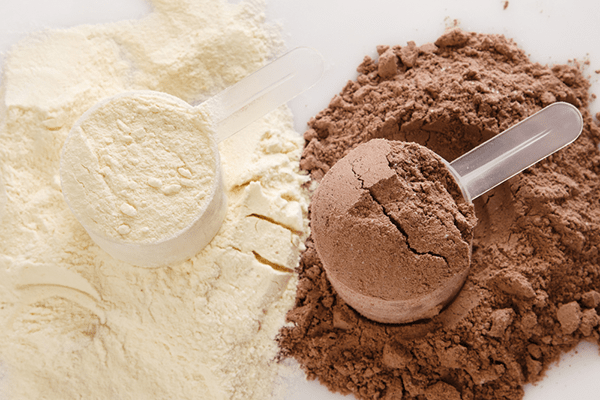
2. Low Carb Tortillas & Bread
Tortillas and white bread on a low-carb diet? If it seems too good to be true, it probably is.
These imitation “low-carb” breads and tortillas are made with highly refined, artificial, and/or chemically altered compounds such as modified wheat starch, vital wheat gluten, and hydrogenated vegetable oils.
Better to use a lettuce wrap for your taco.
3. Vegetable Oils and Spreads
This includes refined oils (canola, peanut, corn, soy), margarine and “butter” spreads, and vegetable shortening.
These industrially processed vegetable fats are often hydrogenated which creates harmful trans fats. They are also disproportionately high in Omega 6 vs Omega 3 fats. (9)
Omega-6 fats may promote inflammation and be linked to chronic inflammatory diseases and obesity. (10)
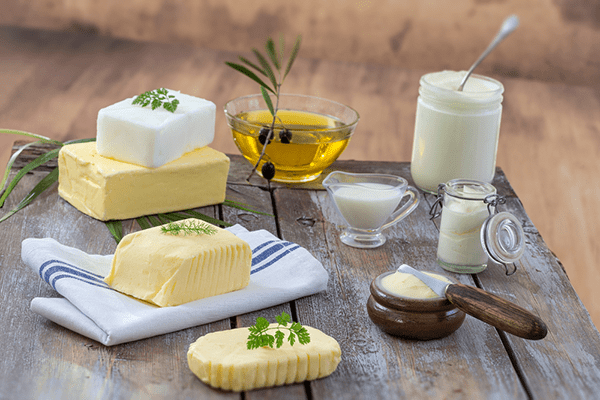
4. Processed Meat
It may be carb-free, but, according to the World Health Organization, there is convincing evidence that processed meat can be linked to a whole host of unwanted health conditions.
Processed meat refers to meat that has been “transformed through salting, curing, fermentation, smoking, or other processes to enhance flavour or improve preservation.” (11)
This includes sausage, hot dogs, jerky, bacon, salami, pepperoni, and deli meats.
5. Protein Bars
With flavors like birthday cake, cookies and cream, s’ mores, it’s easy to see how most low-carb protein bars aren’t exactly health foods.
These highly processed products are loaded with unnatural additives and fillers like emulsifiers (lecithin, xanthan gum, etc.) which are shown to affect the gut microbiome and may lead to intestinal inflammation. (12)
Of course, there are some “clean label” bars made with ingredients like almond butter, collagen, and coconut oil. These contain fewer additives and are a better alternative for the occasional packaged low-carb snack.
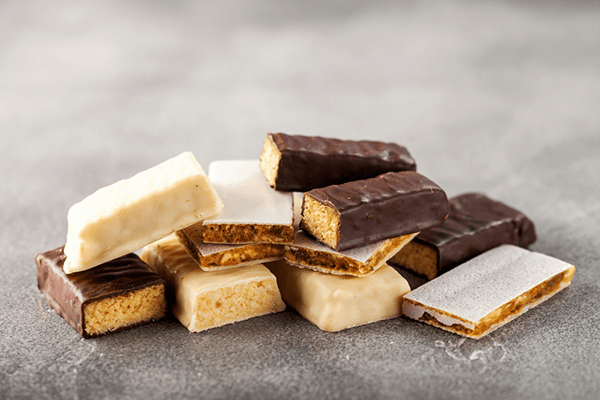
6. String cheese
Highly processed cheeses, like string cheese, are pasteurized and usually not organic.
Pasteurizing dairy kills off many of the natural, gut-health promoting bacteria and enzymes. (13)
You also might want to avoid dairy that isn’t certified organic, as any of the following can be used in the raising of livestock for non-organic dairy production: (14)
- Animal drugs, including hormones, to promote growth
- Plastic pellets for roughage
- Urea or manure added to feed
- Fed animal by-products such as animal fats and rendered products
- Supplements or additives in amounts higher than necessary for nutrition and health
7. Low-Carb Confections
Low carb versions of traditionally high-carb junk foods are still junk foods!
Packaged cookies, cakes, and muffins are ultra-processed and made with bloat-causing sugar alcohols and potentially inflammatory refined vegetable oils.
These processed junk foods provide no nutritional value and displace other, health-promoting calories in your diet.
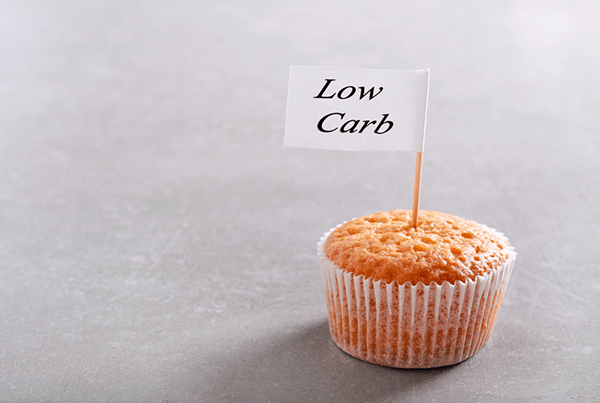
8. Frozen Meals
They boast enticing labels like “6g net carbs” and they’re convenient as heck, but the ingredient labels reveal why most of these packaged meals will cost your health in the long-term.
Here’s a good rule to live by: if you can’t pronounce it, you probably shouldn’t eat it!
This doesn’t mean that organic vegetables and quality meats aren’t great meal shortcuts to keep in your freezer! Just avoid the TV dinner-style minute-meals.
9. Diet Soda
“Diet” and “zero calorie” drinks are usually sweetened with artificial sweeteners.
They may be low in net carbs, but studies show that artificial sweeteners may encourage sugar cravings and sugar dependence and contribute to weight gain. (15)
Recent research also shows that non-caloric artificial sweeteners actually alter the gut microbiome which can lead to glucose intolerance. (16)
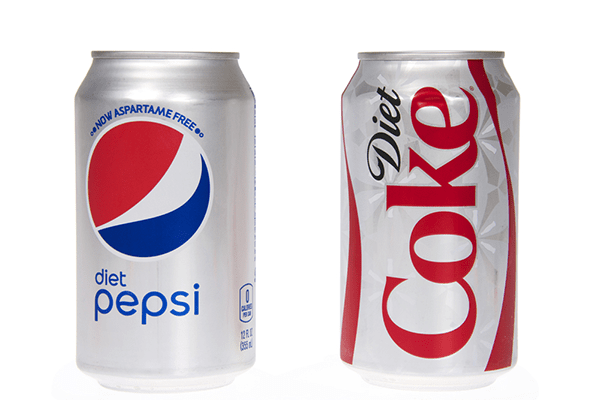
10. Keto Fast Food
Bunless burgers, rice-free burrito bowls, undressed salads–there are certainly ways to order LCHF-complaint at fast-food restaurants!
But fast food is engineered to be addictive and inexpensive, not nutritious. It is generally high in sodium, saturated fat, and preservatives but low in fiber, antioxidants, and other essential nutrients.
Frequent fast-food consumption is associated with systemic inflammation and oxidative stress. It also increases the risk of a whole host of undesirable health conditions. (17)
Final Thoughts
LCHF diets may be better for short-term goals, rather than long-term lifestyles, as whole-food carbohydrates are an important component of human nutrition.
If you do decide to follow a low-carb diet, it’s helpful to make sure it’s comprised mainly of whole foods in order to avoid the potential nutrient deficiencies and long-term health consequences of highly processed foods.
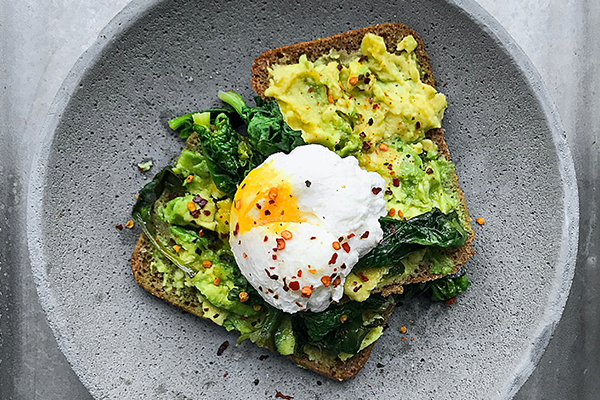



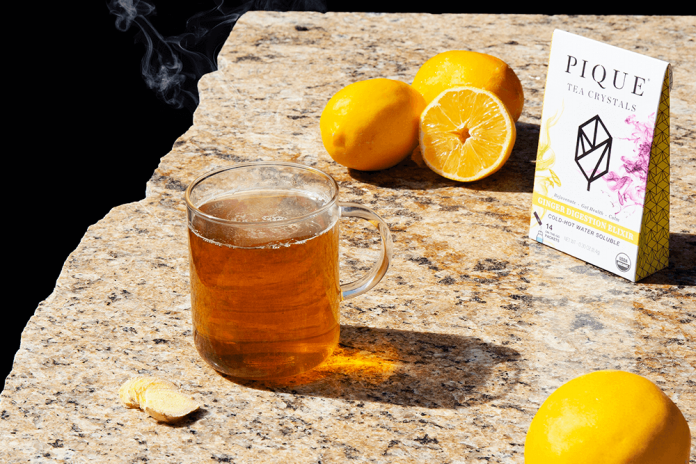


Hi Jessica, Good article in general. However, I would caution you to review newer research regarding the effect of eating eggs on heart health. In 2011, the prestigious journal, Nature, published this research article which demonstrated, “Gut flora metabolism of phosphatidylcholine promotes cardiovascular disease.” Further research published in the distinguished New England Journal of Medicine in 2013 described a previously unknown process whereby the choline in eggs interacts with gut bacteria to produce TMAO in the liver. The oxidized TMA (trimethylamine) directly leads to the deposition of plaque in the arteries. That article is entitled, “Intestinal Microbial Metabolism of Phosphatidylcholine and Cardiovascular Risk.”
Secondly, you note that protein powders have been found to be contaminated with metals and other toxins. The same is true for bone broth, which you recommend as a good beverage. Commercially sold bone broth samples were shown to be high in lead, even the organic broths.
Thank you,
Karen A.